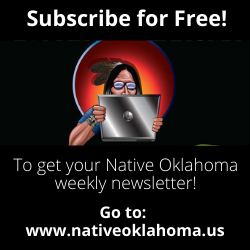

Oklahoma Gov. Kevin Stitt sends 'one-size-fits-all' car tag compact to tribes
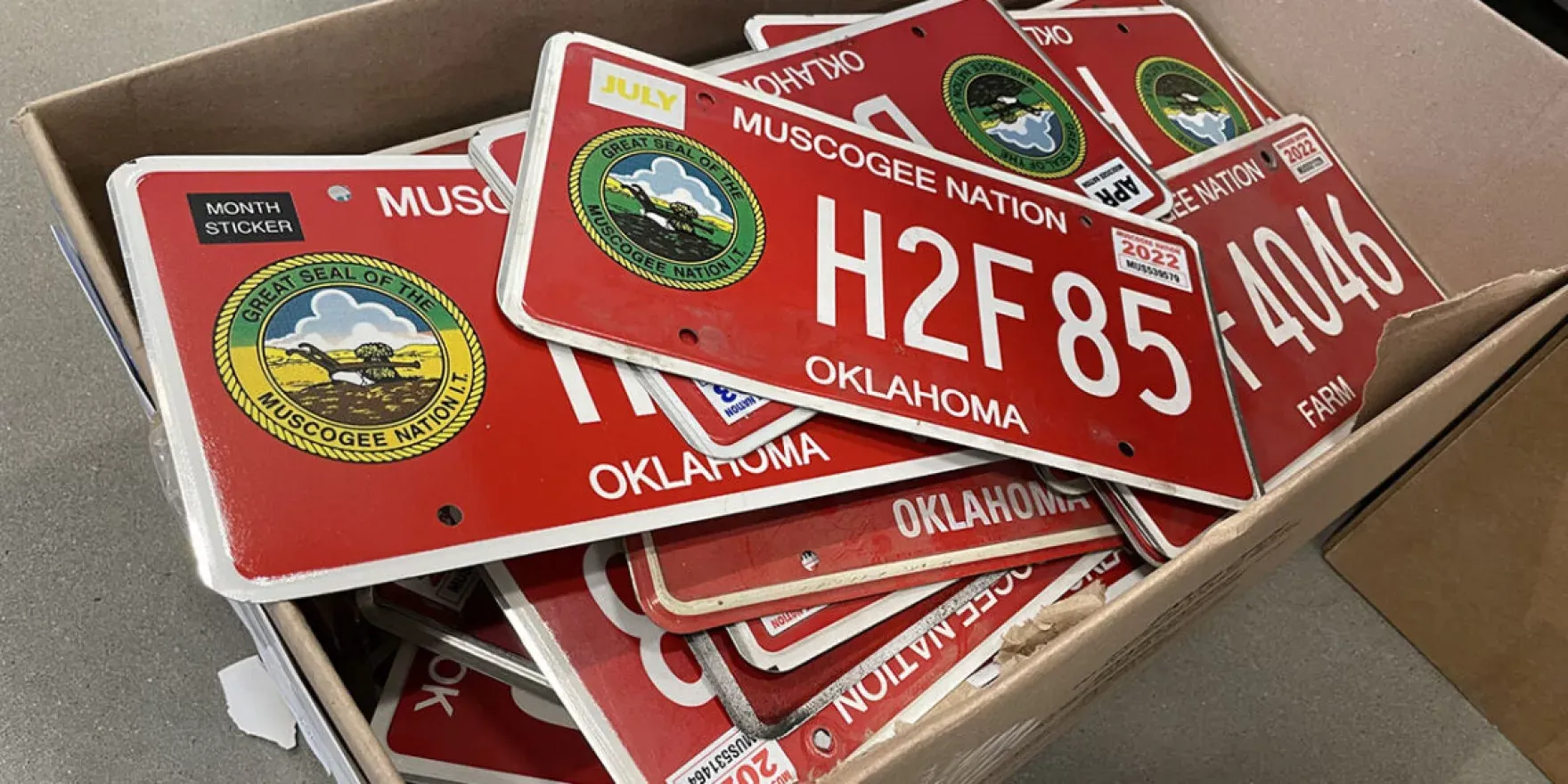
Oklahoma tribal nations across the state have received a letter and model compact from Gov. Kevin Stitt.
By Katie Hallum, KOSU
The letter says if tribal leaders can accommodate the governor’s concerns about tag issues, he would sign the one-size-fits-all compact. These concerns range from public safety problems to outstanding toll fines.
“The purpose of this letter is to further convey my desire to enter long-term motor vehicle registration and license tag compacts with all of Oklahoma’s tribal partners,” Stitt writes. “To that end, my office has prepared the attached model compact, which reflects the same terms as those agreed to by the Chickasaw and Choctaw Nations.”
The governor argues that if all the tribes in the state signed the model compact, it would improve public safety, increase infrastructure spending and improve customer service availability for tribal citizens who could go to a Service Oklahoma location rather than their tribal headquarters.
The conditions in the compact include:
- A 10-year term.
- Applies to all noncommercial vehicles.
- Provides for coordination between the State and the Tribe for the design and manufacture of tribal license plates.
- 85% of funds otherwise distributed to the ROADS funds are remitted to the Tribe after apportionment.
- Provides for certain information or report sharing between the Tribe and the State to ensure public safety and resolve outstanding turnpike toll concerns.
The letter was not sent to the Cherokee, Chickasaw or Choctaw tribes who already had compacts.
It’s unclear what many tribes will do. Osage Nation officials say they will not respond, while the Citizen Potawatomi Nation says it is reviewing the letter. Other tribal officials did not respond.
However, some of the email addresses the letter was sent to are no longer in service or to tribes that don’t issue their own plates. One of the recipients listed is former Ottawa Tribe Chief Ethel Cook, who died last year. Another recipient — a former Comanche Nation chairman — was voted out of office in early March.
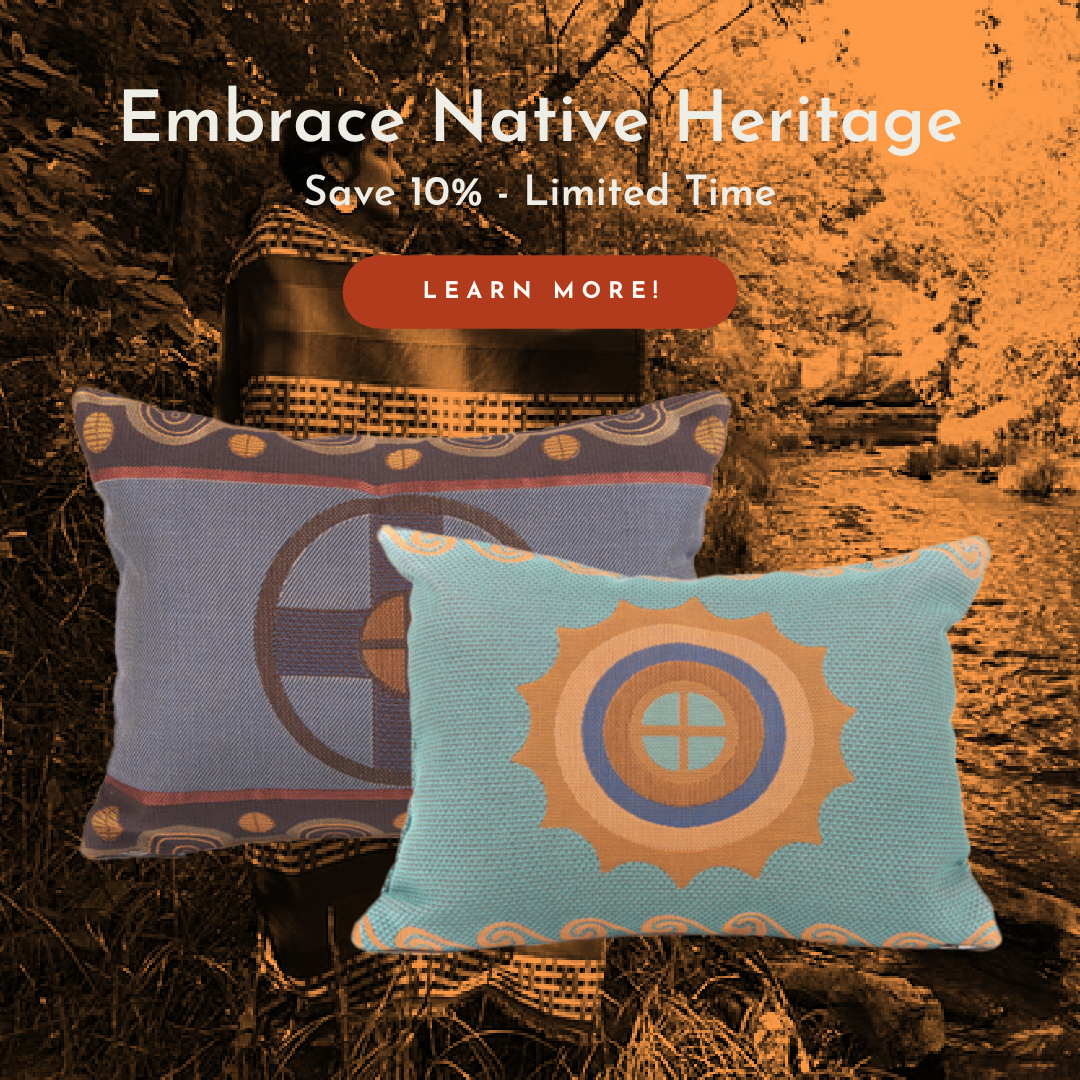
Astronaut John Herrington honored
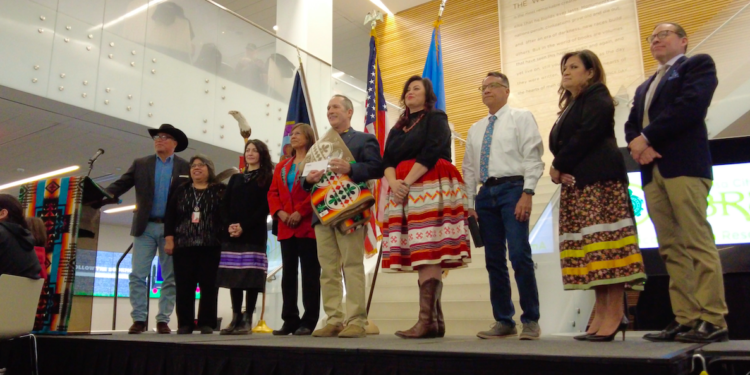
As a kickoff of the American Indian Festival of Words, the Tulsa City County Library honored astronaut and retired Naval aviator Cmdr. John Herrington by adding him to the Circle of Honor.
“If people hadn’t come along in my life to encourage me. If they hadn’t done that we wouldn’t be having this conversation today,” Herrington, a Chickasaw citizen, said. “I wouldn’t have had the opportunity or privilege to be presented with the Circle of Honor from the American Indian Resource Center. I am humbled and to have my family here is a blessing.”
The Chickasaw Honor Guard was in attendance to do the posting of colors during the celebration.
“We posted colors, along with displaying our eagle staff. It is always a pleasure to be a part of ceremonies honoring Chickasaw citizens, especially those for other veterans,” honor guard member Silas Welch said.
The Circle of Honor Award recognizes First Americans from Oklahoma for their lifetime achievements. Recipients’ contributions have had to enhance the life of others, while drawing attention to First American customs, traditions and culture.
“Representing the Chickasaw Nation is truly an honor,” Welch said.
Richard Andrews, Mary Baken, David Cavener, Keith Mowdy, Doyle Somers and Welch were the Chickasaw Honor Guard members who participated in the ceremony.
Herrington’s illustrious military career included the dangerous job of becoming a test pilot. Recognized for his nerves of steel, along with his engineering aptitude, NASA selected Herrington for the nation’s astronaut program. A member of an elite group of individuals, Herrington is in a cohort of nearly 650 people worldwide having the privilege of traveling to space.
“It is estimated that 108 billion people have lived on the Earth. As of today, 644 of us have had a chance to fly in space. (I was told by a friend) Never forget how fortunate you are to have done something so very few people have done. Out of the 644, only 277 have stepped outside and done a spacewalk.” Herrington said at the Festival of Words.
Herrington was the first tribal citizen of a federally recognized tribe to become an astronaut. According to the Oklahoma Historical Society, eight astronauts have had ties to Oklahoma.
He logged nearly 14 days orbiting the Earth, during which he completed three spacewalks.
“While Tulsa is in another reservation, the Tulsa Library recognized Herrington’s Chickasaw heritage and veteran status. Having us there was a sign of respect, both to Cmdr. Herrington and to his tribe’s honor guard,” Welch said.
“It feels good to be able to honor citizens and veterans for their dedication, achievements and representation of First Americans for organizations like the Tulsa Library,” Welch said.
Upon retirement from the U.S. Navy, Herrington continued his education. He earned a Ph.D. in education from the University of Idaho. He can often be found in his home state of Oklahoma promoting STEM (science, technology, engineering and math) education.
“My journey to space began here in Oklahoma,” Herrington said. “You don’t know the people from Oklahoma until you are here, until you are with and spend time with them. To really apricate the people and the red dirt of Oklahoma you must be on the ground. To see it from their perspective.”
Past recipients of the Circle of Honor Award include Oklahoma educators, community leaders, artists and legal scholars. Herrington joins the ranks of First Americans such as Wilma Mankiller, Cherokee; Ruth Blalock Jones, Shawnee/ Delaware/Peoria; and fellow Chickasaw, Neil McCaleb.
“To honor my Native American heritage, I flew a feather and a flute while on the space station,” Herrington said. “The flute was given to me by Jim Gilliam, a Cherokee. He was an engineer at the Kennedy Space Center. The feather was given to me by an elder who was and elder with the American Indian Science and Engineering Society. His wife is Chickasaw.”
Instated in 2004, Herrington is among 11 other First Americans selected during the last two decades to receive the Circle of Honor Award. Circle of Honor Awards are presented biannually by the American Indian Resource Center (AIRC).
“The Tulsa Library AIRC did an excellent job honoring Cmdr. Herrington and were extremely hospitable hosts to the Chickasaw Honor Guard,” Welch said. “This was expressed during a Blanket presentation from the AIRC to the Chickasaw Honor Guard.”
AIRC is located within the Tulsa Library System and maintains the system’s First American collection. AIRC has provided more than 20 years of service to Green Country.
With more than 4,000 artifacts, materials within the collection include fiction and nonfiction books, rare historic treasures, film, music and artwork.
The Chickasaw Honor Guard presenting colors during the opening ceremonies paid homage to all First Americans, as well as acknowledging Herrington’s Chickasaw heritage and service to country.
“The (Chickasaw) Honor Guard participates in the neighborhood of 180 events annually. This year we have already participated in more than 90 postings of colors, community events and funerals,” Welch said. “Community engagement really ramps up during the spring and summer months. We are always looking for new Chickasaw veterans to join our ranks so that we don’t have to turn anyone away.”
The Chickasaw Honor Guard has a dedicated group of 15 volunteer members. Working around each member’s schedule often stretches the honor guard thin in attempts to fulfill event requests. Chickasaw veterans interested in joining or learning more about the Chickasaw Honor Guard are encouraged to visit its office at 1911 Warrior Way, Ada, Oklahoma, or submit a membership application via the Chickasaw Honor Guard service page at Chickasaw.net/ HonorGuard.
For more information about the Chickasaw Honor Guard, call (580) 310-7930.
Other activities during the Festival of Words included a Plains Indian sign language demonstration, First American storytelling, pottery and patchwork make and take workshops, dancing demonstrations, and more.
Indian Citizenship Act centennial commemorated in Oklahoma
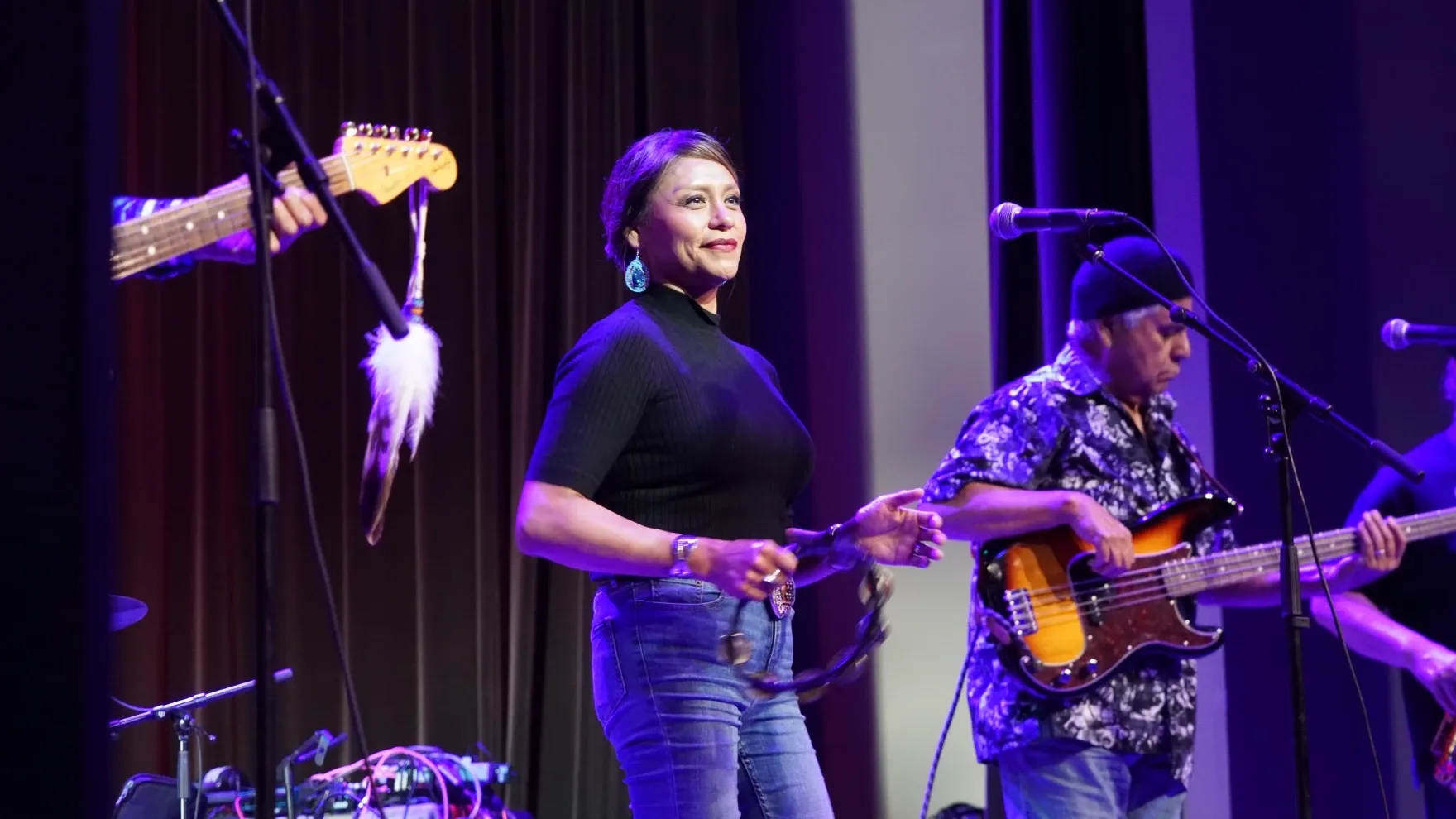
Over the weekend, the First Americans Museum recognized 100 years since the Indian Citizenship Act was passed.
By Katie Hallum, KOSU
People gathered at the Five Moons Theater for a night of fellowship, recognizing the day Indigenous people were granted citizenship and the right to vote. The evening was filled with community, laughter and great music by award-winning artists such as Tonemah, A.J. Harvey, Olivia Komahcheet and Cecil Gray Blues Band.
The event, headed by Rock The Native Vote, was all about encouraging voter engagement and registering.
Comanche citizen and Rock The Native Vote director Ginny Underwood said the event was not a celebration — but a recognition.
“We've gone through generations of people who've endured atrocities and trauma to get us to where we are today,” Underwood said. “This is about our resiliency.”
Kiowa guitarist and singer Cecil Gray hopes Indigenous people will continue to perform this civic duty.
“It’s an honor, playing here for this event, because of all Native Americans used to and continue to endure,” Gray said. “So all you Native Americans please go out and vote, it does make a difference.”
PBS web series highlights Indigenous creativity and innovation
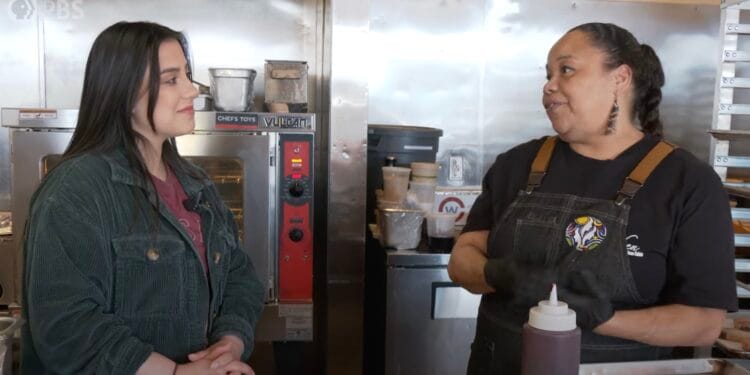
“Sovereign Innovations” host Cheyenne Bearfoot visits with Mvskoke Media
MVSKOKE RESERVATION – A new web series called “Sovereign Innovations” explores the everyday innovation of Indigenous people. The show’s host and video producer, Cheyenne Bearfoot (Chiricahua Apache), spoke with Mvskoke Media about the show’s concept, production, and reach.
With a roughly 10 minute runtime and educational format, “Sovereign Innovations” aims to not only showcase Native innovation, but also correct misinformation and misrepresentation about Native communities. Bearfoot explains, “We try to uplift and highlight Native people today and showcase really what they’re doing. I’ve spoken with Native fashion designers, filmmakers, artisans, chefs, just a whole wide array of different Native folks from different Native tribes.”
Bearfoot noted that each episode tries to hit several goals. She explained, “It’s got a little bit of history, it has a little bit of science, it’s got some contemporary pop culture musings in there, lots of humor, and lots of educational payoff.”
Production Process and Research
The entire production for the show is undertaken with a spirit of collaboration. While there are three main writers, everyone on the team takes part in writing, researching, and fact checking. Bearfoot explained that the rigorous fact-checking process ensures the show is accurate and it also gives the team plenty of room for learning.
The process also enables the production to weave Indigenous ways of knowing into the research process and the structure of the show. Bearfoot said, “We really try to uphold and value traditional Indigenous knowledge ways versus grabbing a scholarly article or pointing people to that direction… there’s so much oral history that doesn’t necessarily get translated into larger pieces of academia.”
Bearfoot explained that this process enables lots of learning on the job. While researching the show’s third episode, “Celebrating the Diversity of Native Homes,” she was blown away by the technological advances in architecture and irrigation techniques in Chaco Canyon, often left out of history books. “It’s just really fascinating how that gets ignored or subverted in history but in this show we’re really taking that back and we’re reclaiming some of this knowledge and these histories and we’re spreading it out to the world.”
Tackling Identity and Connection
From the beginning, working on “Sovereign Innovations” has also been a personal undertaking for the production team and has led to an understanding of Native community connections. The very first episode, “What does ‘authentically’ Indigenous look like?”, delves into misconceptions and misrepresentations on what it means to “look” Native. With a discussion over the ideas of “authentic”, the episode had personal connections for Barefoot and others on the production team.
It was also important for Bearfoot, she explained, to tackle that question head on. “There’s no one way to look like a Native, there’s no one way to look Indigenous. I look very white passing, but I’m half Chiricahua and I’m half white. It was really important for the first episode to talk about that and really just upheave all of those misconceptions of what it means to look Native.”
Because the research process for the show uses Indigenous knowledge as its primary source, it’s important to connect to Native communities. Either through personal contacts or networking, Bearfoot shared that Native communities really show up.
She stated, “That’s the part I treasure so much about interviewing. This show has actually been really healing for me and really affirming as well. Even though it hasn’t been easy, it’s been so great to be in community and talk to different Native folks and especially Native women… We’ve never met each other before in our lives, no from the same tribe, have had different lives, but have had similar shared experiences. It’s so affirming.”
While there is no news yet on a season two for the show, the current seven episodes can be found on the PBS Voices Youtube page and at PBS Digital Studios, which features original education web-based content.
